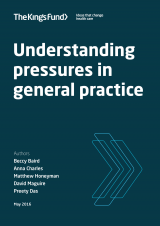 We know that ‘the good GP’, partnering with a patient and their family, is the cornerstone of an effective health system. This is known and proven – the evidence is well established and growing.
We know that ‘the good GP’, partnering with a patient and their family, is the cornerstone of an effective health system. This is known and proven – the evidence is well established and growing.
But where is the evidence that the government (or our representative bodies) are prepared to walk the talk?
Recognition and support of quality general practice has not been seriously addressed in the recent budget (again). The potential benefit of a small as yet undefined pilot of ‘health care homes’ costing $21 million would be welcomed as a start if it were additional to rather than paid for by the same amount pinched from the General Practice PIP program. It is dwarfed by the $925 million lost from general practice by the failure to index MBS payments. I could live with the loss of indexation if the proceeds were used to fund high value activity in general practice. Even better if additional resources in general practice were sourced from those parts of the health system where the savings from better primary care will be realised.
The current funding model penalises practices that go above and beyond the norm to provide comprehensive, team based person-centred care with a focus on quality and safety.
Our communities need high quality general practice. Our general practitioners want to provide the best possible care for their patients.
Surely it is not beyond our ken to design a funding system that aligns financial incentives with the needs of our patients and our own professional goals.
In the UK, the NHS is finding it difficult to recruit and retain sufficient GPs who want to do full-time, patient-facing work. General Practice is expected to undertake more and more work without a corresponding increase in resources. Patients are less satisfied with accessibility and quality.
The Kings Fund has published a paper analysing these new pressures in general practice. Let us not make the same mistakes that they have in the UK. We have a large pool of new graduates eager to provide top notch care. Let’s make sure they are well supported to do so.
Understand Pressures in General Practice
In the UK, the NHS is finding it difficult to recruit and retain sufficient GPs who want to do full-time, patient-facing work.
Increasing demands on general practice over the past five years – not just a heavier workload but the increasing complexity and intensity of work – have led to a feeling of crisis.
Moving care closer to home means that many activities previously undertaken in secondary care are now done in primary care, but funding has not followed the patients. At the same time, more people report difficulty in accessing care and are less satisfied with their experience of using GP services.
This report looks at patient factors, system factors and supply-side issues to see what lies behind this increasing pressure on general practice. It finds that despite GPs being at the heart of the health care system, a lack of nationally available, real-time data has made their changing workload largely invisible to commissioners and policy-makers.

 23 Comments
23 Comments
zumlby
9rz0ws
95s6c9
29hnpy
c8ujhz
mq6o6d
2p9dus
dd1hvv
7fmmrh
fj0lzw
m0j5ge
0udty2
d6z6la
0kigmu
gsek64
ohph0p
zpe5t6
3f3pe1
gy94t9
5ttxnx
mz17mw
jv5nrw
xtd4ab